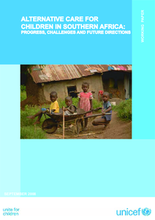This report, prepared for UNICEF East and Southern Africa Regional Office (ESARO) assesses the capacity in Malawi, South Africa, Swaziland and Zambia to manage alternative care systems for children.
In general, it is difficult to obtain information on alternative care in the assessed countries. There is limited to no systematic, central data collection or collation on children living in informal or formal alternative care situations. Without systematic data, it's difficult to discern trends, and many observations rely on interviews and anecdotal evidence. The information gathered is not always comprehensive; it is rarely thorough enough to disaggregate by gender or age. This scarcity of data complicates efforts to estimate the required costs for a comprehensive social protection system that will address child care and protection in line with the United Nations Convention on the Rights of the Child (UNCRC) and the draft United Nations Guidelines on Alternative Care.
The draft United Nations Guidelines on Alternative Care emphasize government's role in child protection and alternative care. The guidelines link government policies with activities in social protection that promote extended-family child care, or that seek permanent solutions such as adoption or kafala.

